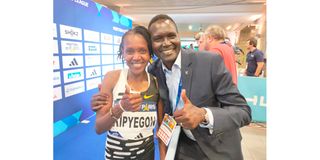Olympians have huge potential as agents of change

Kenya's Faith Kipyegon (left) poses for a photo with National Olympic Committtee of Kenya (NOC-K) President Paul Tergat after breaking the World record in the women's 5000m event during the IAAF Diamond League "Meeting de Paris" athletics meeting at the Charlety Stadium in Paris on June 9, 2023.
What you need to know:
- The interest and concentration in listening to Rudisha and Paul Tergat give their own stories of taking up athletics, training, competition and their experience while at the top was amazing
- The National Olympic Committee of Kenya is not taking a back seat in recognising, honouring and giving our legends their rightful place to inspire our generations, young and old
This week, we had the privilege of attending the Bouches-du-Rhône Region sports awards. Bouches-du-Rhône Region is in my view equivalent of a subcounty administratively but budget-wise equivalent to a county in Kenya. It has something our counties can emulate in supporting and recognising sports federations operating in their own regions.
Close to two hours after conclusion of the brief, colourful and elaborate ceremony we were still at the venue. World 800 metres record holder David Rudisha was still signing autographs, taking photos with the athletes present and being interviewed. These were top athletes in the region but were very happy to meet Rudisha. From the young to the old, all wanted to take photos and have their shirts, cards, books, bags, and sports equipment autographed by him.
A day before, there was a convention on Innovation and Technology hosted by the Emerging Valley Group at the scenic “The Camp”. Interestingly the Camp was built to host strategy meetings and promotes futuristic thinking and approach to world issues. The annual Forum wad to reflect on partnerships and cooperation between Europe and Africa.
Rudisha was among the panelists in the time of the discussion centred on “Innovation and the Olympic Games: When the Bouches-du-Rhône Territory Sprints with Africa.” The interest and concentration in listening to Rudisha and Paul Tergat give their own stories of taking up athletics, training, competition and their experience while at the top was amazing. Their views on technology and the emerging trends in sports innovation was worth all the time they were given.
Towards the end, Rudisha and Tergat had another opportunity among the several others to attend session with school children. During the session, well-thought out questions on environment and culture came up. Again, Rudisha was on top of his game in talking about the Maasai as a tribe and their cultural practices, and how they are now on the forefront of climatic conservation.
As I followed these great athletes, I wondered why as a country we have written off our legends too early. Do we engage them as front liners to emerging issues and through their influence, shape sports agenda?
The National Olympic Committee of Kenya is not taking a back seat in recognising, honouring and giving our legends their rightful place to inspire our generations, young and old. I was proud that a week earlier the NOC-K had invited Rudisha, among other great athletes, to speak at the national athletes forum.
The Kenyan athlete is the pride of not only Kenya, and Africa, but also the world.
The 2024 Olympics in Paris is 236 days away. The Olympics period presents NOC-K, the country, brands in the country and those abroad a great opportunity to leverage the Kenyan athletics brand to market the country. The successful events in Marseille, with just one of our legends, has given us a great example of the endless opportunities athletes have. What we can do as an NOC-K is to train them and brand them, so they can know how to market not just themselves but also their communities and the country when they travel abroad.
As we parted with Rudisha, he said he is going back to push the agenda on climate to great levels. For a world record holder, we shall be joining hands to break another record in conservation.
Mutuku is the Secretary General of the National Olympic Committee of Kenya.





